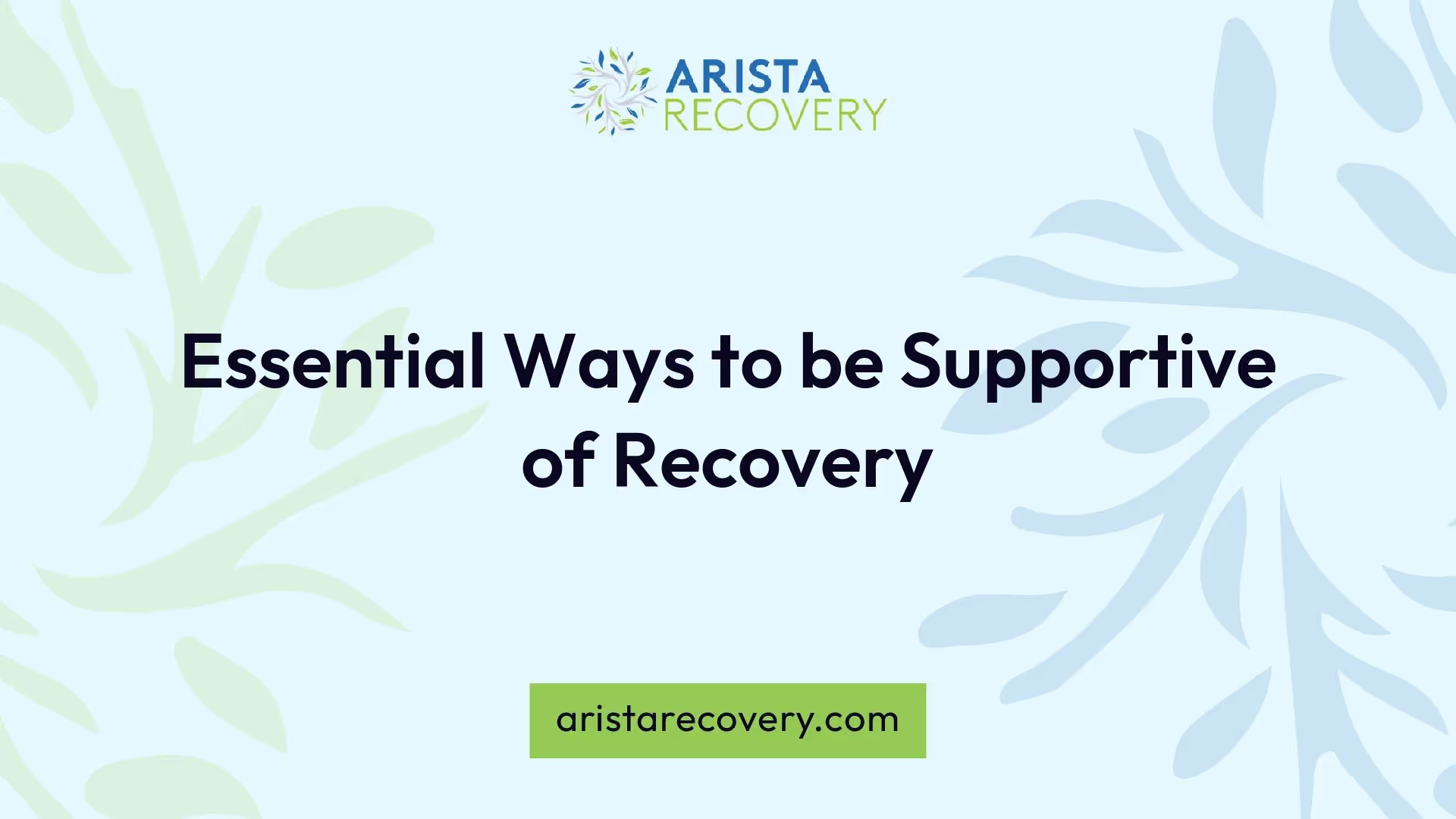
Essential Ways to be Supportive of Recovery
Supporting Recovery in Addiction
Supporting recovery in addiction involves understanding different recovery perspectives and fostering an environment conducive to healing.

Understanding Recovery Perspectives
Recovery is a personal journey shaped by individual experiences. Approximately 2 in 3 adults who have experienced mental health issues consider themselves to be in recovery. Among those with substance use problems, about 7 in 10 share the same sentiment. This illustrates that recovery is not a singular experience but rather a process that varies widely.
Recognizing that each person's recovery journey is unique enables better support from loved ones. Understanding that recovery can be defined and experienced differently influences how support is offered and enhances the relationships involved in the process.
Creating a Supportive Environment
Creating a nurturing environment is crucial in supporting the recovery process. Hope serves as the foundation of recovery and allows individuals to build upon their strengths, coping abilities, and values, backed by the encouragement of peers, friends, and family members.
A supportive environment contributes to successful relapse prevention. Here are key factors that reinforce a supportive setting:
FactorDescriptionHopeEssential for recovery, instills motivation and resilience.Social RelationshipsImprove stress management and contribute to a sense of belonging. Encouragement from these relationships can significantly enhance the perceived quality of life [2].Growth and ImprovementRecovery involves continual personal improvement in health and wellness, reinforcing a positive outlook on life [1].
Building a healthy support system aids in the long-term recovery journey. It helps manage setbacks and fosters resilience, which are pivotal during the early stages of recovery.
Establishing a receptive environment alongside understanding different recovery perspectives lays the groundwork for sustained support. For more insights on supporting a loved one during recovery, check our article on five ways support loved one through treatment.
Supporting a Loved One in Recovery
Supporting a loved one in their recovery journey can be challenging yet rewarding. It requires understanding, patience, and a willingness to help navigate the complexities of addiction and recovery.
Encouraging Professional Help
Encouraging a loved one to seek professional help for addiction or mental health issues is essential for their recovery journey. Support and understanding regarding available options, including therapy, counseling, medication-assisted treatment (MAT), and support groups, can significantly benefit the recovery process.
Here is a table outlining some common types of professional help:
Type of HelpDescriptionTherapyIndividual or group therapy to address underlying issues.CounselingOffers support and guidance in dealing with addiction.Medication-Assisted TreatmentCombines medication with behavioral therapy to aid recovery.Support GroupsProvides a community of peers experiencing similar struggles.
Opioid use disorder, for instance, may be treated effectively with medications like buprenorphine, while alcohol dependence can be managed with acamprosate or naltrexone. Being aware of these options allows families to discuss and encourage the pursuit of professional help with their loved one.
Recognizing and Responding to Relapse
Relapse can be a part of the recovery journey. Recognizing signs of relapse and responding with empathy is crucial. Some common indicators of relapse include changes in behavior, mood swings, or withdrawing from healthy support systems. It's important to stay informed about the effects of addiction and to remain engaged with support groups and therapists.
Signs of RelapseSuggested ResponsesMood ChangesListen and provide a safe space for expressing feelings.IsolationEncourage connection with support networks.Increased StressOffer help with stress management techniques.
Providing support during these times can help prevent further setbacks in the recovery process. It is vital for loved ones to approach situations with compassion and understanding, ensuring that the person in recovery feels supported rather than judged. Staying engaged with appropriate resources and support can significantly help in managing the journey towards healing and wellness.
Building a Healthy Support System
Creating a supportive environment is crucial for anyone navigating the recovery process. A healthy support system can significantly enhance recovery outcomes. This section will discuss the role of social relationships and the utilization of recovery support groups as vital components of a successful recovery strategy.
Role of Social Relationships
Social connections play a key role in recovery from addiction. According to Addictions.com, positive social relationships improve the ability to manage stress, foster a sense of belonging, and enhance overall quality of life. Research indicates that supportive social networks correlate with higher abstinence rates and better treatment completion rates.
The size and composition of an individual's social network—especially the presence of other abstinent individuals—are significant. Having more people in one's life who support sobriety can lead to better outcomes. A study revealed the following benefits of strong social relationships in recovery:
OutcomeBenefitSubstance Use RatesLower rates with increased social supportTreatment RetentionHigher retention with supportive networksQuality of LifeEnhanced life satisfaction with supportSelf-EfficacyIncreased confidence in maintaining sobriety
Social support is frequently cited as a critical factor in the recovery journey. The presence of supportive friends and family members can help individuals remain focused on their recovery goals. For additional insights on supporting loved ones through their treatment, refer to our article on five ways to support a loved one through treatment.
Utilizing Recovery Support Groups
Recovery support groups, such as Alcoholics Anonymous (AA) and Narcotics Anonymous (NA), provide essential resources for individuals in recovery. These organizations offer opportunities for individuals to connect with others who share similar experiences. They also provide access to mentors (sponsors), which can be particularly beneficial during challenging times [2].
Participation in these groups is linked to positive recovery outcomes. For instance, members typically experience larger social networks, higher-quality friendships, and increased social support over time. This support is vital in relapse prevention efforts. Here are some key features of recovery support groups:
Support Group TypeFeaturesAA / NAPeer support, shared experiences, mentorshipOxford HousesRecovery homes providing a community settingRegional HotlinesImmediate crisis response resourcesLocal ClinicsAccess to professional help and treatment
Engaging in mutual help organizations provides critical social support resources essential for sustaining recovery. The connections made within these groups often lead to lasting relationships that enhance well-being and promote abstinence.
For more strategies on helping someone in recovery, visit our article on ten ideas to help give up alcohol or explore the cognitive consequences of methamphetamine addiction.
Evidence-Based Practices in Recovery
Evidence-based practices are integral to effective addiction recovery strategies. Two of the most recognized methods include Cognitive-Behavioral Therapy (CBT) and Medication-Assisted Treatment (MAT). Each plays a vital role in supporting individuals as they navigate the recovery process.
Cognitive-Behavioral Therapy (CBT)
Cognitive-Behavioral Therapy (CBT) is a prominent and highly effective treatment for individuals dealing with addiction. This therapeutic approach assists participants in managing stress and controlling cravings. It also helps them challenge negative thoughts and identify triggers that can lead to relapse. Key benefits of CBT include:
CBT BenefitsDescriptionStress ManagementParticipants learn strategies to cope with stress effectively.Craving ControlIndividuals develop skills to manage cravings and urges.Negative Thought IdentificationCBT helps challenge and change negative thought patterns.Relapse PreventionClients identify personal triggers and establish coping mechanisms.
Furthermore, Dialectical Behavioral Therapy (DBT), a branch of CBT, is also beneficial in supporting emotional regulation and coping strategies, especially for those experiencing intense emotions due to substance use disorder.
Medication-Assisted Treatment (MAT)
Medication-Assisted Treatment (MAT) proves highly effective in conjunction with behavioral therapy. This approach combines prescribed medications with therapeutic interventions tailored to specific addictions. For example, buprenorphine is commonly used for opioid use disorder, while acamprosate and naltrexone can aid in managing alcohol dependence [5].
The advantages of MAT include:
MAT BenefitsDescriptionReduced Withdrawal SymptomsMedications help alleviate the discomfort associated with withdrawal.Craving ReductionMedications can lessen cravings, supporting individuals in staying sober.Improved Mental and Physical HealthMAT enhances overall well-being and health outcomes.Increased Employment RatesIndividuals undergoing MAT often find improvement in their work lives.Decrease in Criminal ActivityParticipation in MAT correlates with reduced criminal behavior associated with addiction.
By combining these evidence-based practices—CBT for cognitive restructuring and behavioral skills, along with MAT for medical support—individuals can significantly improve their chances of achieving lasting recovery from addiction. For more insights on being supportive of recovery, consider exploring our article on five ways to support a loved one through treatment.
Therapy in Mental Health Recovery
Therapy plays a crucial role in the recovery process for individuals facing addiction and mental health challenges. It provides essential support and guidance, helping clients navigate their journey toward sobriety and mental well-being.
Role of Therapists
Therapists are vital in supporting clients throughout their recovery journey. They offer guidance, insights, feedback, and practical strategies to help individuals overcome challenges and reach their goals [6]. Their role includes promoting holistic, coordinated, and continuous services that address a client’s overall well-being rather than episodic care [7].
Key responsibilities of therapists include:
Overcoming Barriers to Therapy Access
Accessing therapy can be challenging for many individuals due to several obstacles. Common barriers include financial constraints, lack of available services, and social stigma associated with seeking help. Addressing these barriers is crucial for supporting recovery.
Some strategies to overcome these challenges include:
BarrierSolutionFinancial ConstraintsExplore sliding scale options, community mental health services, and insurance coverage for therapy.Lack of AvailabilityUtilize teletherapy and online resources to access professionals who may not be available locally.Social StigmaEducate the community to reduce stigma and normalize the conversation around mental health and addiction.
By taking proactive steps to address these barriers, individuals can access the necessary therapeutic support that is essential for their recovery journey. For more information on supporting loved ones during recovery, check out our guide on five ways support loved one through treatment.
Maintenance in Recovery
Sustaining progress in recovery requires ongoing effort and intentional practices. The journey of recovery is not linear; rather, it is characterized by growth, resilience, and the ability to manage setbacks. Understanding ways to be supportive of recovery can aid individuals in maintaining their hard-won progress.
Sustaining Progress and Stability
To sustain progress and stability during recovery, it is essential to establish a structured routine that includes regular activities and responsibilities. Individuals can benefit from creating a balanced schedule that prioritizes their physical, mental, and emotional well-being.
In developing this routine, individuals should consider the following key aspects:
ActivityFrequencyPurposeCounseling sessionsWeeklyProvides professional supportPhysical exercise3-5 times a weekEnhances mental and physical healthSocial activitiesWeeklyFosters social connectionsPersonal reflectionDailyEncourages self-awareness
Having a stable and sober housing environment is also crucial for recovery. Sober living homes offer a drug- and alcohol-free residence, providing a safe and supportive setting for individuals in recovery [8].
Moreover, fostering hope is vital, serving as the foundation of recovery. Hope thrives when supported by strengths, talents, coping abilities, and resources, reinforced by the presence of peers, family members, and friends [1].
Importance of Self-Care Practices
Self-care practices are fundamental in maintaining recovery. By prioritizing their health and well-being, individuals can manage stress and reduce the risk of relapse. Self-care encompasses a range of activities aimed at promoting mental and physical wellness.
Essential self-care practices may include:
Additionally, setting boundaries with loved ones struggling with addiction is crucial for personal well-being. These boundaries enable individuals to focus on their recovery and reduce stress while also allowing them to offer better support during the recovery process [9].
Incorporating these practices can significantly enhance the stability of recovery and contribute to long-term success. For more insights and assistance, individuals can explore five ways to support a loved one through treatment and ten ideas to help give up alcohol.
References
[2]:
[3]:
[4]:
[5]:
[6]:
[7]:
[8]:
[9]:
When mental health challenges and addiction intersect, it can feel isolating. At Arista, we offer compassionate, evidence-based, and trauma-informed care to help you heal, grow, and move forward.
You’re not alone in this.
When mental health challenges and addiction intersect, it can feel isolating. At Arista, we offer compassionate, evidence-based, and trauma-informed care to help you heal, grow, and move forward.
Support that moves with you.
You’ve taken a brave first step. At Arista Recovery, we’re here to help you continue with best-in-class care designed for long-term healing and support.
.webp)






